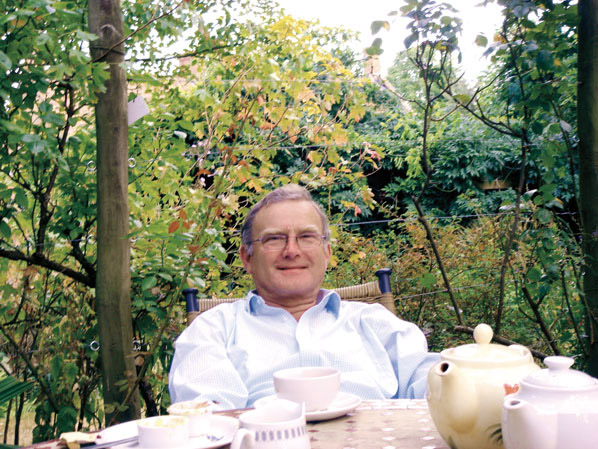Prison governor reformed British penal system.
Ian Malcolm Dunbar ’58

Ian Malcolm Dunbar ’58, May 21, 2010, in Somerset, England, from an undiagnosed degenerative disease.
A penal reformer who rose through the ranks of Britain's prison service to become on of its most prominent leaders—and critics, Ian was the first exchange student to Reed from Keele University (University College of North Staffordshire, Keele) in England. He came to Reed for his junior year, and arrived in Portland on a Greyhound bus, overcome by the spectacular beauty he had witnessed in the journey through the Columbia Gorge. Memories from that year were strengthened by the friendships he made at the college. “He was an instant celebrity on campus,” wrote Caroline Miller ’59, MAT ’65. “Everyone loved him. He was ebullient, full of good humor, and the best representative for England anyone could have wished for. Also, he was handsome and much admired by the ladies on campus.”
In an oral history interview with Scott Benowitz ’96, Ian recalled assisting in commons and recording books and papers for Arthur Leigh [economics, 1945–88], whom he had met when Arthur was at Keele on sabbatical. “I was very, very fond of Art Leigh. I admired his intellect. He was such a nice person and he helped me tremendously.” Ian recalled a debate with West Point students that he won with his lifelong friend Dick Stevenson ’58. Dick sent us Ian's lengthy obituary from the Times of London, as did Ian Ellison, Keele exchange student to Reed in 1963–64, who wrote: “He certainly became an important man back in Britain in a vocation which is a little unusual. The respect in which he was held can be measured by the mere fact that the Times chose to obituarise him, gave him the lead position on the day, and then wrote at such length.” After Reed, Ian returned to England by way of Montgomery, Alabama, where he met Martin Luther King Jr.; the experience left a lasting impression on him. Ian earned an honors degree from Keele in politics and economics and a diploma in social studies. He later received a diploma in applied social studies from the London School of Economics.
As a young man, Ian had felt drawn to the ministry, but turned instead to the Prison Service, which he joined in 1959. He served in various capacities at assistant, deputy, or full governor at five very different prisons (Leyhill, Long Lartin, Usk, Wakefield, and the infamous Wormwood Scrubs). He became director of inmate administration for the Prison Service, responsible for safeguarding and promoting prisoners' rights, and lectured frequently on penal issues in England, Canada, and the United States. The Times obituary described Ian as cheerful, enthusiastic, and energetic. “Throughout his career he was keenly committed to the rehabilitation of prisoners. His remarkable empathy with others gained the trust of many prisoners and staff, enabling him to make improvements despite the inertia of penal institutions.” Said Ian: “I know enough about alienation to know that unless we treat people positively then they will become more alienated and a worse threat to society. The key is meaningful activity and we need much more of it.”
Conditions at Wormwood Scrubs were so bad that prisoners staged a riot in 1979; after the previous governor departed, Ian was put in charge. He immediately instituted a series of reforms which he described in a subsequent book, A Sense of Direction (1985). Written following visits to penal systems in Canada, Sweden, and the U.S., the work proposed clarifying the Prison Service’s aims and tasks; encouraging positive, active regimes; and introducing the proper monitoring of performance. Further, Ian developed the concept of dynamic security: close involvement of staff with prisoners in high-security regime reduced the risks of escapes. These ideas were implemented in the years that followed. In 1993, Ian was made a Companion of the Most Honourable Order of the Bath in recognition of his work. In retirement, he and Sally, his wife of 44 years, enjoyed traveling, beekeeping, and charity work. That the year at Reed had a significant effect on his life, he acknowledged in the oral history interview with Scott: “I think it was the intellectual rigor, combined with a sense of fairness. That prejudice and knee-jerk reactions in life are not helpful at all. And the important thing is, in terms of any difficult situation is to get as near to uncovering and unraveling the facts as possible. And to treat people with a degree of fairness and humanity . . . There are other features, obviously, in my background, in my life, which led me to this. But it was always the intellectual rigor that I have found in very, very difficult situations to be extremely helpful.”
Caroline Miller remembered visiting Ian at one of his prisons and being introduced to two very pleasant inmates. “After they walked away, I asked what they'd done to land in prison. Ian answered with a twinkle in his eye. 'They killed someone.' I looked askance and drew in my breath—just the reaction he looked for. Ian smiled as if to console me. 'No need to worry, Carrie. They're no longer dangerous. Unlike the rest of us, they have solved their problem.'”
Survivors include his wife, daughter, and two sons.
Ian Dunbar's humane values earned wide respecct, reported the UK Independent newspaper obituary.
Appeared in Reed magazine: December 2010
comments powered by Disqus


![Photo of Prof. Marvin Levich [philosophy 1953–94]](https://www.reed.edu/reed-magazine/in-memoriam/assets/images/2022/LTL-levich1.jpg)
![Photo of President Paul E. Bragdon [1971–88]](https://www.reed.edu/reed-magazine/in-memoriam/assets/images/2020/Bragdon.jpg)
![Photo of Prof. Edward Barton Segel [history 1973–2011]](https://www.reed.edu/reed-magazine/in-memoriam/assets/images/2020/Segel.jpg)








































































